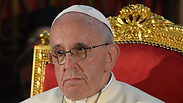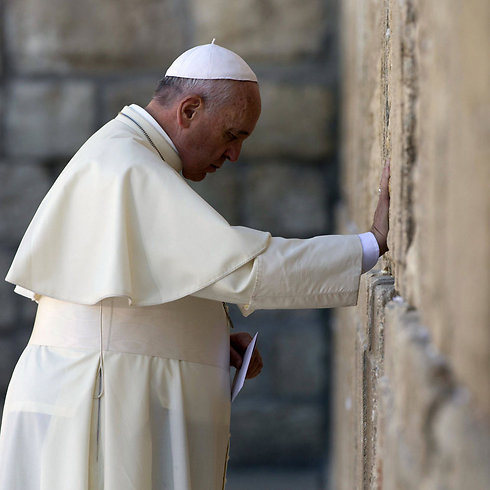
Pope at the Western Wall: I pray God will make peace prevail
In sign of interfaith friendship, Pope Francis embraces Argentine friends Argentine Rabbi Abraham Skorka, and leader of Argentina's Muslim community, Omar Abboud.
"I have come here to pray to God to make peace prevail," Pope Francis said Monday as he prayed at the Western Wall, one the Jews' most revered shrines and a sole remnant of their sacred Second Temple, destroyed by the Romans in 70 AD.
Before approaching the Holy site the Pope received a briefing on the history of the Temple Mount by a guide using a three dimensional map. The Pope heard of the two Jewish Temples, their destruction, and the evolving architecture of the Temple Mount.
Like many visitors, he tucked a small written message between the ancient stones before walking away.
He left a note with the text of the "Our Father" prayer written in his native Spanish in one of the cracks between the stones.
When St. John Paul II visited the Western Wall in 2000, he left a note asking forgiveness for the suffering inflicted on Jews by Christians over history. Pope Benedict XVI's note prayed for peace for Christians, Muslims and Jews alike.
Pope Francis then embraced his good friend, Argentine Rabbi Abraham Skorka, and a leader of Argentina's Muslim community, Omar Abboud, both of whom joined his official delegation for the trip in a sign of interfaith friendship.
"The Jerusalem you have arrived at, honored Pope, is not only the physical Jerusalem. It is also the Jerusalem of dreams; the dream of millions of Jews throughout two thousand long years of exile. Jerusalem is a dream that has been realized; we are still walking in it as dreamers, expecting the full realization of the dream," said Western Wall Shmuel Rabbi Rabinowitz.
Relating to the destruction of the Second Temple, Rabbi Rabinowitz spoke of Titus’s Arch in Rome, which depicts the exile of the Jews. "It is true, Titus succeeded in taking the Menorah (candelabrum) and the tools of the Temple; but the light of faith, and the hope to return to the land of our fathers, he was not successful in extinguishing," he remarked.
"We have traveled a long road on the way home; we have journeyed from the four corners of the land."
Quoting the vision of the prophets, he read from the Book of Isaiah: "And many peoples shall go and say: 'Come ye, and let us go up to the mountain of the Lord, to the house of the God of Jacob; and He will teach us of His ways, and we will walk in His paths.' For out of Zion shall go forth the law and the word of the Lord from Jerusalem."
Rabbi Rabinowitz concluded by asking believers of all religions "to fight hatred and anti-Semitism which has increases more and more."
The pope then signed a visitor's book where he expressed his thanks and quoted the prophet Isaiah: "Nation shall not lift up sword against nation, neither shall they learn war any more."
In a decision that delighted his hosts, Francis later laid a wreath at the tomb of Theodor Herzl, who is seen as the founder of modern Zionism that led to Israel's foundation.
The Catholic Church initially opposed the creation of a Jewish state, and the three other pontiffs who have come to Jerusalem over the past 50 years did not visit the site.
Aryeh Savir of the Tazpit News Agency contributed to this report.











